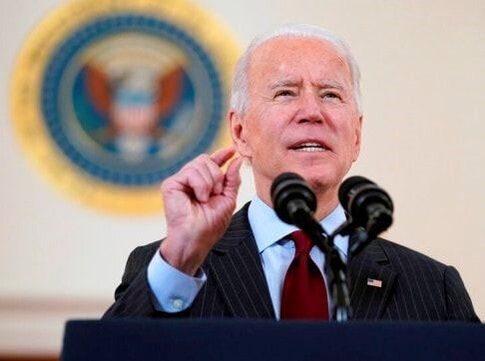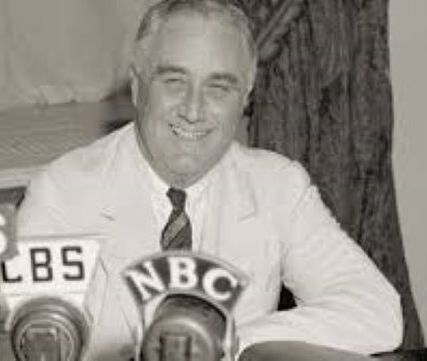 Watching Biden Watching Biden The President of the United States leaned forward, to speak to a nation, maybe even a world. This much he knew, he said. We will get through this. He was speaking at the White House Monday to honor 500,000 Americans who have died, so far, in the pandemic. He was speaking like a parent, like a leader, like a healer. “I know it’s hard, I promise you. I know it’s hard, I remember,” Biden said. “That’s how you heal, you have to remember. It is also important to do that as a nation. To all those who have lost loved ones, this is what I know: They’re never truly gone. They will always be part of your heart.” Everybody knows about his losses – a first wife and a young daughter, a grown son. And he seemed to know about their losses, all half a million. “This seems unbelievable, but I promise you, the day will come, when the memory of the loved one you lost will bring a smile to your lips before a tear to your eyes…I pray for you that day will come sooner rather than later.” This reassurance was unlike anything the United States, the entire world, had heard from a President in the previous four years. No need to elaborate or explain -- just that he cared. During this speech, I had a flashback, to my earliest memories, when my parents and grandmother would turn off the lights and put up dark shades over the windows, in case of a bombing raid. And when my family was reassured by the same crackling voice on the radio that had sustained people during the Depression.  Thinking of FDR Thinking of FDR Franklin Delano Roosevelt did it like the patrician he was. Joe Biden is a man of the working people. But nobody has quite aimed for the heart of the collective "we" as FDR did. My mother cried the day FDR died in 1945. She had lost her father to an auto accident as she entered her teens. FDR came along a few years later. Now Joe Biden is trying his imperfect best to be a leader to this fractured country. He says there are no Republicans, no Democrats, in this fight against the Covid virus. Biden has been taking on stature since Rep. Jim Clyburn rescued him from the snowbanks of Iowa and New Hampshire, and presented him to the hearts of Black voters, not just in South Carolina but all over. This was more than a political move; it was a move of faith. Now Biden speaks to everybody who will listen, not about him, but about them. He is elderly, and he speaks as an elder. "You're gonna be okay. You're gonna be okay." After presiding over a moment of silence in front of thousands of lit candles, outside the White House, Biden returned past the military guards, into his new home. His shoulders seemed to be sagging from the pain of all those deaths, but Jill Biden would occasionally touch him, so tactile, so caring. And through the window the TV camera picked up Doug Emhoff, the big-time lawyer and husband of Vice President Harris, putting his hand on Joe Biden’s right shoulder, patting him, several times, reassuring the healer. * * * And speaking of dignity, Merrick Garland was interviewed by the Senate Monday, regarding his nomination for Attorney General. This is the man who was shafted – as was the entire nation – by Mitch McConnell in the final year of the Obama regime, keeping Garland from the Supreme Court. Now Garland was speaking of the values he would bring to the Attorney General. Without mentioning the servile Bill Barr, the previous attorney general, Garland emphasized that he would be serving the country, not the President. He is clearly a man of intellect and character. We have real people, people who feel. All of us are being liberated. * * * (President Biden's speech. The most wonderful part is around 6;00.)
Chris Vecsey
2/23/2021 12:23:28 am
In 1967 Robert N. Bellah published his now famous article, "Civil Religion in America. He began: "While some have argued that Christianity is the national faith, and others that church and synagogue celebrate only the generalized religion of 'the American Way of Life,' few have realized that there actually exists alongside of and rather clearly differentiated from the churches an elaborate and well-institutionalized civil religion in America. This article argues not only that there is such a thing, but also that this religion-or perhaps better, this religious dimension-has its own seriousness and integrity and requires the same care in understanding that any other religion does."
Randolph
2/23/2021 07:48:49 am
George and Chris,
George Vecsey
2/23/2021 08:41:26 am
Chris, the youngest of we five, is Harry Emerson Fosdick Professor of the Humanities and Native American Studies in the Department of Religion at Colgate University. Currently working on his next book. Keep typing, young feller. GV
Andrew L. Tansey
2/23/2021 10:21:10 pm
Wow! Words cannot do this justice. "the subordination of the nation to ethical principles that transcend it in terms of which it should be judged." Principles such as truth? I learned about the hierarchy of values development there in Olin Hall as a psych ("gut") major. Presented with the choice between party loyalty and such principles, I hope the new regime will continue to represent a further shift from the former in this regard. Thank you both for your inspiring wisdom.
George
2/24/2021 10:14:36 am
Andy: You went to Colgate? And you didn't take a course with my brother Chris? I do run into his former students here and there -- one, a very idealistic lawyer, now a magistrate in NYC; another, a writer who helped on a prominent book. Then there is a guy in the media I know who had Chris at a previous college. I would always greet the guy by shouting: "You owe a paper to my brother!" He was always working on it...a few decades later. I'm sure you don't. Good to hear from you. GV
Andy Tansey
2/24/2021 09:34:18 pm
Yes, I attended Colgate, but no, I did not study with Chris.
George Vecsey
2/23/2021 08:46:21 am
I am thinking of Mr Khizr Khan, father of a soldier who died in Iraq, carrying a copy of the US Constitution and citing it to the office temp who was President at the time. GV
Altenir Silva
2/24/2021 10:06:12 am
Dear George,
bruce
2/24/2021 10:18:04 am
george, Comments are closed.
|
Categories
All
|









